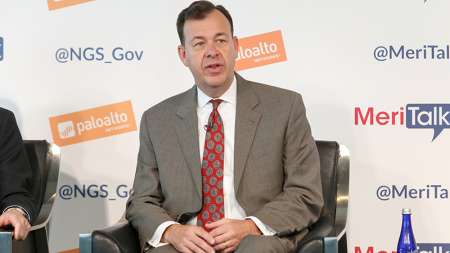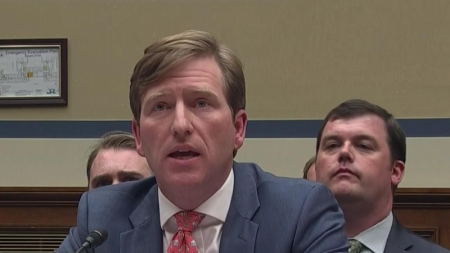Paul Beckman, chief information security officer at the Department of Homeland Security, said Thursday at MeriTalk’s Cyber Security Brainstorm that software-defined networking, adopting a zero-trust model, and optimizing DHS’ security operations centers (SOC) are his biggest emerging priorities to promote better security across the department. […]
Welcome to MeriTalk News Briefs, where we bring you all the day’s action that didn’t quite make the headlines. No need to shout about ‘em, but we do feel that they merit talk. […]
The Library of Congress awarded Accenture a new contract to build a data center, with an estimated contract value of $27.3 million over the performance period, including a one-year base and an additional two one-year options. Accenture Federal Services, a wholly owned subsidiary of Accenture, will migrate the Library of Congress and the U.S. Copyright Office’s current data center to new hosting environments. […]
Former U.S. Chief Information Security Officer Greg Touhill today called on Congress and the Trump administration to work together to take “bold action” to advance Federal government IT modernization, arguing that investments in modernization would pay off with a host of benefits including better IT security. […]
MeriTalk today announced the winners of its inaugural FITARA Awards program, recognizing six Federal agencies who have made tremendous strides in modernizing their IT environments and one congressional leader who has worked tirelessly to promote the reform of IT acquisitions and adoption of cyber best practices. […]
Obstacles to data sharing are holding back the potential for artificial intelligence (AI) in Federal agencies. However, the use cases and potential of AI makes it worth the struggle, according to experts. […]
Federal CIO Suzette Kent, chair of the Technology Modernization Fund (TMF) board, said today she recognizes the imperative to share data with Congress on TMF progress, as the opportunity to secure […]
Federal CIO Suzette Kent said today at MeriTalk’s Cyber Security Brainstorm that the Federal government needs to possess a “never done” mindset when it comes to tackling persistent cyber threats and the related imperative to modernize Federal agency IT environments in order to address the threats. […]
Senate FY2019 funding for the Technology Modernization Fund (TMF) remains stuck on zero following the Senate’s approval earlier today on a 92-6 vote of a “minibus” appropriations bill that wraps together four separate spending bills including one to fund financial services and general government (FSGG) budgets. […]
Welcome to MeriTalk News Briefs, where we bring you all the day’s action that didn’t quite make the headlines. No need to shout about ‘em, but we do feel that they merit talk. […]
Sens. Lindsey Graham, R-S.C., Sheldon Whitehouse, D-R.I., and Richard Blumenthal, D-Conn., introduced two pieces of legislation on Tuesday designed to improve cybercrime prevention and strengthen U.S. election infrastructure. […]
The White House released a memo to agencies on Tuesday that highlighted its priorities for research and development for fiscal year 2020, including leadership in artificial intelligence and strategic computing, increased connectivity and technology modernization within agencies. […]
The Pentagon is looking to get on top of the next wave of artificial intelligence technologies through a fast-track contracting program that would bring new concepts from the drawing board to proof-of-concept within 18 months. […]
Panelists at MeriTalk’s Cyber Security Brainstorm on Thursday will shed light on a host of vital cybersecurity issues, including threats to control systems, the foundational importance of security to IT modernization efforts, and the keys to success in risk-based security practices, according to a sneak peek into the thinking of just a few of the 25 experts scheduled to speak. […]
Vice President Mike Pence, speaking at the Department of Homeland Security National Cybersecurity Summit today, called upon Congress to pass long-delayed legislation that would officially create the Cybersecurity and Infrastructure Security Agency (CISA) under DHS. […]
Welcome to MeriTalk News Briefs, where we bring you all the day’s action that didn’t quite make the headlines. No need to shout about ‘em, but we do feel that they merit talk. […]
The General Accountability Office said in a report issued today that the Internal Revenue Service made some progress during FY 2017 in addressing information security control issues previously flagged by GAO, but it also said a more recent audit by the watchdog agency covering FY 2017 turned up newly identified control deficiencies – leaving IRS with a total of 154 improvement recommendations at the end FY 2017. […]
Speaking at the Department of Homeland Security’s (DHS) inaugural National Cybersecurity Summit, Christopher Krebs, under secretary for DHS’ National Protection and Programs Directorate, announced formation of the Information Communications Technology Supply Chain Task Force. […]
Legislators and witnesses emphasized today at a hearing of the Senate Committee on Health, Education, Labor, and Pensions the importance of improving interoperability of Electronic Health Record (EHR) systems and said interoperability improvements will not only save administrative time and money but also will improve the quality of care patients receive. […]
Following the Department of Homeland Security’s announcement of a new National Risk Management Center, critical infrastructure executives along with Federal agency leaders hailed the new coordinating wing of DHS as a way to harness the collective strengths of both government and industry to address cyber concerns that have the potential to hobble the nation’s critical functions. […]
The Department of Homeland Security (DHS) will launch a National Risk Management Center this week to provide a first response outlet for private sector critical infrastructure companies that are targeted by cyberattacks, DHS Secretary Kirstjen Nielsen announced today. […]
Security in the cloud is a shared responsibility between cloud service providers (CSPs) and government organizations. CSPs provide agencies with a secure platform to operate on, but it is the responsibility of agency security leaders to ensure the applications that are being hosted have been hardened, according to security experts. […]
Booz Allen Hamilton has won an $885 million task order to provide artificial intelligence (AI) and machine learning support to the U.S. Government Program Office, for use by the Defense Department (DoD), the company announced Monday. […]
Welcome to MeriTalk News Briefs, where we bring you all the day’s action that didn’t quite make the headlines. No need to shout about ‘em, but we do feel that they merit talk. […]
Booz Allen Hamilton has won a task order worth up to $1.03 billion to provide services under the Continuous Diagnostics and Mitigation (CDM) Program to CDM’s Group D Federal agencies, according to contracting information on the General Services Administration’s (GSA) Federal Procurement Data System. […]
President Trump on Friday nominated James Gfrerer to head IT for the Department of Veterans Affairs. Pending Senate confirmation, Gfrerer will be the VA’s CIO and assistant secretary for information and technology. […]
State-sponsored cyberattacks are the new normal in adversarial international activity, whether on large or small scales. […]
At a House Homeland Security Committee hearing on Wednesday, July 25, to examine findings of the Federal Cybersecurity Risk Determination Report and Action Plan released by the Office of Management and Budget (OMB) in May, lawmakers and private sector witnesses hailed new legislation as a necessary – but on its own insufficient – step to bring down the security risks of three-quarters of Federal agencies deemed in cyber danger. […]
Disruptive technologies such as artificial intelligence (AI) and the Internet of Things (IoT) can help Federal agencies better utilize their data to improve processes, public and private sector technology officials said during a FedInsider webinar on July 25. […]
The Federal workforce of the future will most likely consist of supervisors, the human workforce, contractors, and a new kind of worker–the digital employee that is equipped to reduce the burden of repetitive, simple tasks on humans. […]
























